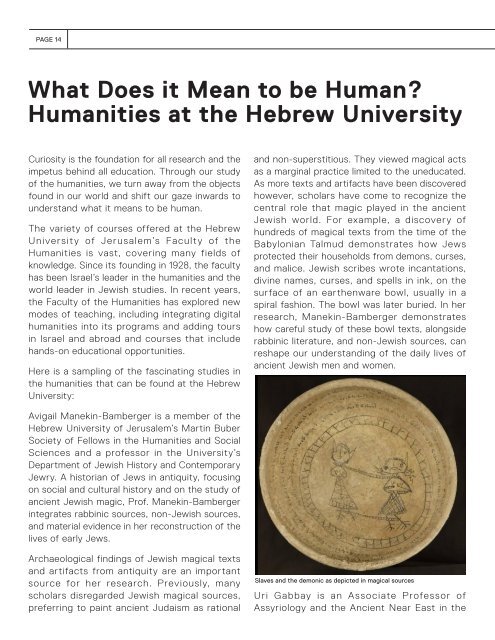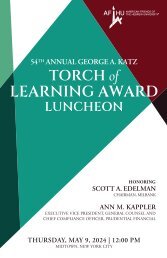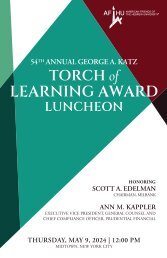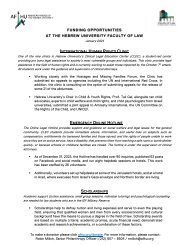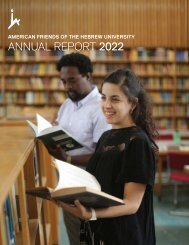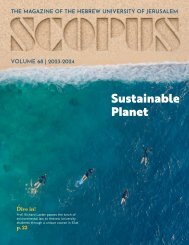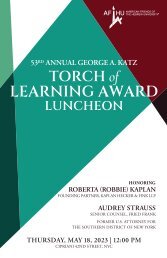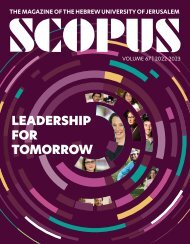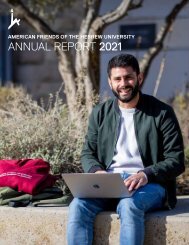AFHU News Winter 2023
- No tags were found...
Create successful ePaper yourself
Turn your PDF publications into a flip-book with our unique Google optimized e-Paper software.
PAGE 14<br />
AMERICAN FRIENDS OF THE HEBREW UNIVERSITY<br />
<strong>AFHU</strong> NEWS VOL. 31 PAGE 15<br />
What Does it Mean to be Human?<br />
Humanities at the Hebrew University<br />
Curiosity is the foundation for all research and the<br />
impetus behind all education. Through our study<br />
of the humanities, we turn away from the objects<br />
found in our world and shift our gaze inwards to<br />
understand what it means to be human.<br />
The variety of courses offered at the Hebrew<br />
University of Jerusalem’s Faculty of the<br />
Humanities is vast, covering many fields of<br />
knowledge. Since its founding in 1928, the faculty<br />
has been Israel’s leader in the humanities and the<br />
world leader in Jewish studies. In recent years,<br />
the Faculty of the Humanities has explored new<br />
modes of teaching, including integrating digital<br />
humanities into its programs and adding tours<br />
in Israel and abroad and courses that include<br />
hands-on educational opportunities.<br />
Here is a sampling of the fascinating studies in<br />
the humanities that can be found at the Hebrew<br />
University:<br />
Avigail Manekin-Bamberger is a member of the<br />
Hebrew University of Jerusalem’s Martin Buber<br />
Society of Fellows in the Humanities and Social<br />
Sciences and a professor in the University’s<br />
Department of Jewish History and Contemporary<br />
Jewry. A historian of Jews in antiquity, focusing<br />
on social and cultural history and on the study of<br />
ancient Jewish magic, Prof. Manekin-Bamberger<br />
integrates rabbinic sources, non-Jewish sources,<br />
and material evidence in her reconstruction of the<br />
lives of early Jews.<br />
Archaeological findings of Jewish magical texts<br />
and artifacts from antiquity are an important<br />
source for her research. Previously, many<br />
scholars disregarded Jewish magical sources,<br />
preferring to paint ancient Judaism as rational<br />
and non-superstitious. They viewed magical acts<br />
as a marginal practice limited to the uneducated.<br />
As more texts and artifacts have been discovered<br />
however, scholars have come to recognize the<br />
central role that magic played in the ancient<br />
Jewish world. For example, a discovery of<br />
hundreds of magical texts from the time of the<br />
Babylonian Talmud demonstrates how Jews<br />
protected their households from demons, curses,<br />
and malice. Jewish scribes wrote incantations,<br />
divine names, curses, and spells in ink, on the<br />
surface of an earthenware bowl, usually in a<br />
spiral fashion. The bowl was later buried. In her<br />
research, Manekin-Bamberger demonstrates<br />
how careful study of these bowl texts, alongside<br />
rabbinic literature, and non-Jewish sources, can<br />
reshape our understanding of the daily lives of<br />
ancient Jewish men and women.<br />
Slaves and the demonic as depicted in magical sources<br />
Uri Gabbay is an Associate Professor of<br />
Assyriology and the Ancient Near East in the<br />
Institute of Archaeology.<br />
Prof. Gabbay’s research focuses on the liturgy,<br />
ritual, and intellectual history of ancient<br />
Mesopotamia, especially in the first millennium<br />
B.C.E. His research is based on an analysis of<br />
cuneiform tablets in Sumerian and Akkadian,<br />
with a special interest in the Sumerian ritual<br />
laments that were an important part of the<br />
temple liturgies of ancient Mesopotamia. In<br />
addition to deciphering and reconstructing the<br />
texts, Prof. Gabbay integrates other cultural and<br />
archaeological sources to reconstruct the ritual<br />
and music of these ancient temples.<br />
Prof. Gabbay also hopes to gain insights from the<br />
Mesopotamians themselves. Using translations of<br />
texts from Sumerian into Akkadian, and Akkadian<br />
commentaries on different religious texts, he<br />
seeks to discover the ways Mesopotamian<br />
scholars viewed and interpreted their own texts<br />
and culture. In a recent project funded by the<br />
European Research Council, his team of Ph.D.<br />
students and post-doctoral researchers worked to<br />
combine the study of ritual and the study of the<br />
ancient interpretations, remembering that temple<br />
priest-scholars are the source for both.<br />
An example of Assyrian and Sumerian writing carved on clay or stone<br />
Oded Erez is a Professor in the Musicology<br />
Department. Prof. Erez specializes in the study<br />
of popular music, including music used in films<br />
and other media. With a focus on Israel and<br />
the Eastern Mediterranean, his research seeks<br />
to provide an understanding of popular music<br />
cultures, highlighting the interplay of the music’s<br />
aesthetics and its social/political meaning. Much<br />
of his work focuses on the politics of “East” and<br />
“West” in Israel at a time when social hierarchies<br />
and ethnic identities are being contested.<br />
One of his studies focused on the extraordinary<br />
popularity of Greek music in Israel since the late<br />
1950s and its use as a means of negotiating and<br />
subverting the Jew/Arab dichotomy, a dichotomy<br />
that was central to the organization of the new<br />
state’s national culture and instrumental to the<br />
marginalization of Mizrahi Jews. Prof. Erez also<br />
studied the role of music in Arab public schools<br />
during Israel’s early decades, viewing the music<br />
as a unique window into the dynamics of inclusion<br />
and exclusion that underline the encounter<br />
between the Jewish State and its Arab citizens.<br />
In other research, he has explored the resurgence<br />
of Arabic in the contemporary popular music<br />
of Israeli Jews, looking at the different ways in<br />
which Arabic is performed as a “post-vernacular”<br />
language (a heritage language that no longer<br />
serves primarily for everyday communication),<br />
and has written about the status of Mizrahiyut<br />
(the “Eastern”) in contemporary Israeli “sonic<br />
economies.”<br />
Prof. Erez’s latest project, Mixing Rituals, provides<br />
the first major study of Israeli wedding music,<br />
focusing on wedding DJs and their audiences.<br />
Supported by an ISF grant, the study is the first<br />
ethnomusicological study anywhere to investigate<br />
the central role of wedding DJs as cultural<br />
brokers, at once heirs to the traditional functions<br />
of the professional wedding musician, mediators<br />
of elements from club culture into the realm of<br />
familial and communal celebration, and actors in<br />
the commercial field of the wedding industry.<br />
Sharon Krishek is a Professor in the Department of<br />
Philosophy. Her area of research is the philosophy


